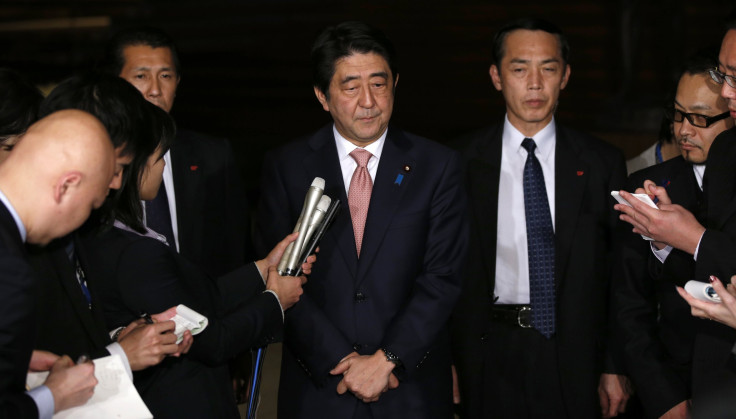Japan ISIS Hostages: Abe Won't Pay Ransom, Can't Deploy Military Amid National Defense Debate

Japanese Prime Minister Shinzo Abe is caught in a difficult situation: he has vowed to save the two Japanese civilians held hostage by the Islamic State militant group while also being pressured to uphold Japan's efforts in combating terrorism by not giving in and paying ransom. The hostage crisis comes as Abe is pushing for Japan to become a bigger international military player and revamp its anti-war constitution, an already divisive proposal in a nation long opposed to military action.
Abe said this week Japan will not “give in to terrorism” by meeting the demands of the Islamic State for a $200 million ransom within 72 hours for hostages Haruna Yukawa and Kenji Goto. But in many ways, his next move is limited by competing global and domestic pressures. “On one hand, Abe wants to appear as a strong leader to the international community and not give in to the terrorist’s demands,” said Shihoko Goto, senior associate of the Asia Program at the Wilson Center think tank in Washington D.C. “On the other, he needs to appear as a caring leader who can protect his citizens. In a way, it’s almost a no-win situation for Abe."
Richard Weitz, director of the Center for Political-Military Analysis at the Hudson Institute, a think tank in Washington D.C., said Abe has several options: he could pay up, encourage another government to extract the hostages, or rely on intermediaries to negotiate on Japan's behalf. Abe has already sought help from Middle Eastern leaders for the rescue, but negotiating has been discouraged by Japan's biggest ally, the United States because it could give the terrorist group also known as ISIS, which is trying to establish itself as a caliphate, some validity. If Abe chooses to pay the ransom, “he will go down a notch as being a reliable ally internationally,” said Goto. “Abe knows that he cannot do diplomacy by the pocket book.”
Among the few countries with the military capabilities to complete a successful hostage extraction in a terrorist stronghold are the United States and the United Kingdom, according to Michael Auslin, director of the Japan Studies at the American Enterprise Institute, a research institute in Washington D.C.. But both have failed to rescue their own citizens who have been held hostage by ISIS in recent months -- Americans James Foley, Steven Sotloff, and Peter Kassig, and British nationals David Haines and Alan Henning were all beheaded by ISIS last year. “If the U.S. can’t even do it,” said Auslin, “it's definitely not for Japan."
Abe's military options are limited. Japan does not have a standing army. Instead, its Japan Self-Defense Force is only allowed by the nation's pacifist constitution to defend against direct attacks on Japanese soil. The JSDF opened an anti-piracy base in Djibouti in 2011, but it does not have the capabilities to perform an extraction of the hostages, and even if it did, it would not be able to act on foreign territory under the constitution.
Abe has worked in recent months to persaude lawmakers to pass legislation that would allow the JSDP to more easily be deployed outside Japan. Abe’s government approved a record defense budget for 2015. More recently, Abe announced Monday that he would expand the anti-piracy JSDF base in Djibouti to include aircraft patrol and the rescue of Japanese civilians in Middle East emergencies, according to Japanese paper Asahi Shimbun. But some lawmakers have opposed his bid to acquire more firepower because of the nation's long opposition to military action. “Because of this situation, Japan’s hands are tied,” said Goto.
Doug Bandow, senior fellow at the Cato Institute, a think tank in Washington D.C., said the JSDF Djibouti base will likely be used to evacuate Japanese civilians in difficult situations such as unrests, rather than a hostage crisis. “All these: the military orientation, the increased military spending, is part of a larger package to make Japan seem more of a normal country,” he said. “I think Abe’s just trying to make Japan be more of an international actor.”
Abe's proposed defense bill would allow for Japan to participate militarily on an international stage for the first time since World War II. But polls show Japanese voters are divided over whether Japan should be more involved in international military affairs. The kidnapping of Yukawa and Goto has only sharpened that debate. “There are worries that Abe is getting Japan too involved in potential disputes with neighbors,” said Auslin. “At the same time, there is a sentiment that Japan should also be able to protect its civilians like any other country."
© Copyright IBTimes 2025. All rights reserved.






















